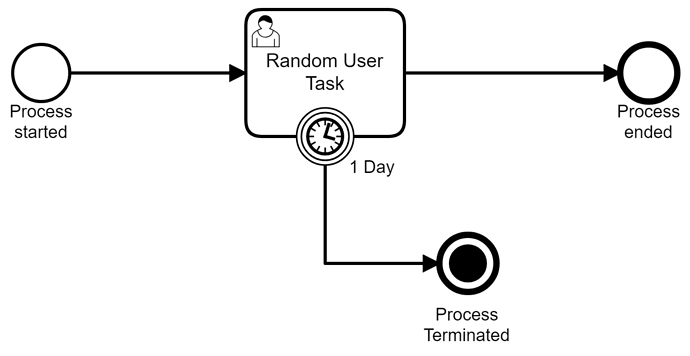Disclaimer: I’m aware of the following similar questions asked on the forum.
None of them provided me the answer. Therefore, I’m taking liberty to post my question.
In the given simple process there is a timer which monitors the user task with a deadline.
The attempt is to acquire the timer Job instance programmatically so that it can be suspended/resumed at will.
In order to achieve that, a combined JavaDelegate and TaskListner class has been added to User Task “Random User Task”. Unfortunately though, it cannot find any job instances. The delegate class has been attached to start execusion listner for the user task as well as to create and assignment events as task listner.
The code in the execution/task listener looks like below.
final ManagementService managementService = execution.getProcessEngineServices().getManagementService();
LOGGER.info("How many jobs are there for current process instance? "
+ managementService
.createJobQuery()
.processInstanceId(execution.getProcessInstanceId())
.count());
LOGGER.info("How many jobs are there in total? " + managementService.createJobQuery().count());
for (var job : managementService.createJobQuery().list()) {
LOGGER.info("\nJob Details: " + job.toString());
}
The example log extracts are:
INFORMATION:
LoggerDelegate::execute invoked by processDefinitionId=JobFinder:1:3, activtyId=randomUserTask, activtyName='Random User Task', processInstanceId=5, businessKey=null, executionId=7
Jan. 24, 2020 3:14:50 NACHM. test.camunda.delegation.LoggerDelegate execute
INFORMATION: How many jobs are there for current process instance? 0
Jan. 24, 2020 3:14:50 NACHM. test.camunda.delegation.LoggerDelegate execute
INFORMATION: How many jobs are there in total? 0
Jan. 24, 2020 3:14:50 NACHM. test.camunda.delegation.LoggerDelegate notify
INFORMATION:
LoggerDelegate::notify invoked by processDefinitionId=JobFinder:1:3, activtyId=randomUserTask, activtyName='Random User Task', processInstanceId=5, businessKey=null, executionId=7
Jan. 24, 2020 3:14:50 NACHM. test.camunda.delegation.LoggerDelegate notify
INFORMATION: Current Event: create
Jan. 24, 2020 3:14:50 NACHM. test.camunda.delegation.LoggerDelegate notify
INFORMATION: How many jobs are there for current process instance? 0
Jan. 24, 2020 3:14:50 NACHM. test.camunda.delegation.LoggerDelegate notify
INFORMATION: How many jobs are there in total? 0
Jan. 24, 2020 3:14:50 NACHM. test.camunda.delegation.LoggerDelegate notify
INFORMATION:
LoggerDelegate::notify invoked by processDefinitionId=JobFinder:1:3, activtyId=randomUserTask, activtyName='Random User Task', processInstanceId=5, businessKey=null, executionId=7
Jan. 24, 2020 3:14:50 NACHM. test.camunda.delegation.LoggerDelegate notify
INFORMATION: Current Event: assignment
Jan. 24, 2020 3:14:50 NACHM. test.camunda.delegation.LoggerDelegate notify
INFORMATION: How many jobs are there for current process instance? 0
Jan. 24, 2020 3:14:50 NACHM. test.camunda.delegation.LoggerDelegate notify
INFORMATION: How many jobs are there in total? 0
On the other hand, the process can be driven through a test JUnit test driver application. There using the management service instance acquired through process engine object can indeed display the job.
The code in the test driver function is
System.out.println("\nJob Count: " + query.count());
for (var job : query.list()) {
System.out.println("\nJob Details: " + job.toString());
}
The output on console is below.
===========================================================
Job Count: 1
Job Details: TimerEntity[repeat=null, id=9, revision=1, duedate=Sat Jan 25 15:14:50 CET 2020, repeatOffset=0, lockOwner=null, lockExpirationTime=null, executionId=7, processInstanceId=5, isExclusive=true, retries=3, jobHandlerType=timer-transition, jobHandlerConfiguration=timerTaskTerminator, exceptionByteArray=null, exceptionByteArrayId=null, exceptionMessage=null, deploymentId=1]
===========================================================
I’m trying to solve this mystery, why execution listener cannot see any jobs whereas test application can. Could anyone please help me?
The link to full fledged application code is here
Thanks and Regards
Chaitanya


